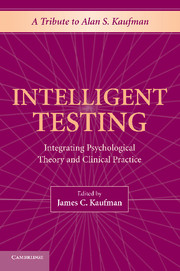Book contents
- Frontmatter
- Contents
- Acknowledgments
- Alphabetical List of Authors and Affiliations
- PART ONE THOSE WHO KNOW HIM
- 1 Alan S. Kaufman's Contributions
- 2 Who Is Alan S. Kaufman?
- 3 Alan S. Kaufman: The Man and the Professional
- PART TWO INTELLIGENT TESTING
- PART THREE THE INTERSECTION OF THEORY AND MEASUREMENT
- PART FOUR KAUFMAN ACROSS THE WORLD
- Author Index
- Subject Index
1 - Alan S. Kaufman's Contributions
Published online by Cambridge University Press: 05 August 2012
- Frontmatter
- Contents
- Acknowledgments
- Alphabetical List of Authors and Affiliations
- PART ONE THOSE WHO KNOW HIM
- 1 Alan S. Kaufman's Contributions
- 2 Who Is Alan S. Kaufman?
- 3 Alan S. Kaufman: The Man and the Professional
- PART TWO INTELLIGENT TESTING
- PART THREE THE INTERSECTION OF THEORY AND MEASUREMENT
- PART FOUR KAUFMAN ACROSS THE WORLD
- Author Index
- Subject Index
Summary
The field of intelligence testing has been revolutionized by the work of Alan S. Kaufman. As the project manager for the Wechsler Intelligence Scale for Children – Revised (WISC-R), he worked directly with David Wechsler. His best-selling book, Intelligent Testing with the WISC-R, introduced and popularized the phrase “intelligent testing,” an idea that stressed the psychologist's theoretical knowledge and experience as the primary ingredient for meaningful and appropriate testing to occur. Single numbers, or scores, mean little by themselves; the key to functionality is the score within a broad, yet individualized, context. The test examiner is expected to apply her integrated and internalized training and bring her own clinical experience to the testing session. In this way, the examiner can best help the child or adult being evaluated by understanding and interpreting a wide range of behaviors, and making direct inferences about observed problem solving strategies, to answer pertinent referral questions. Every aspect of psychology is brought into play to interpret a set of scores in the context of accumulated research. This kind of assessment is far more likely to change lives than the narrow, test-centered intelligence testing more typical of the decade of the 1970s, when Kaufman was venturing farther away from his “pure” measurement background and feeling the needs of clinicians.
Kaufman, with Nadeen, then created his own series of tests: the Kaufman Assessment Battery for Children (K-ABC), the Kaufman Test of Educational Achievement (K-TEA), the Kaufman Brief Intelligence Test (K-BIT), the Kaufman Adult and Adolescent Intelligence Test (KAIT), and many other instruments.
- Type
- Chapter
- Information
- Intelligent TestingIntegrating Psychological Theory and Clinical Practice, pp. 3 - 4Publisher: Cambridge University PressPrint publication year: 2009

